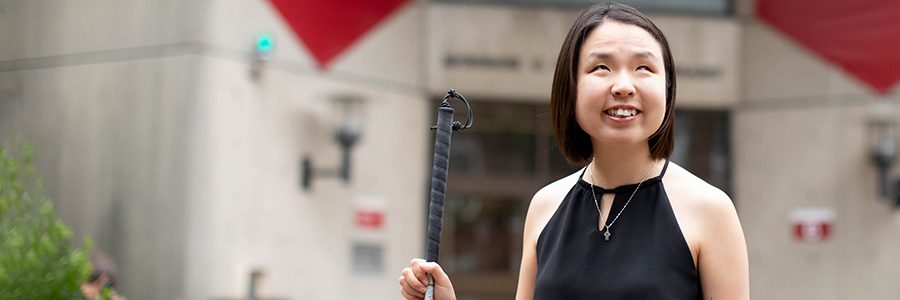Providing a voice for the unrepresented
Miso Kwak is a Harvard Graduate School of Education student who published a student publication on disability with other students. Rose Lincoln/Harvard Staff Photographer
Among a myriad of accomplishments achieved by, 2013 Diamond Bar alumna Miso Kwak, now a graduate of Harvard University, is a publication dedicated to those with disabilities.
Growing up blind, Kwak said she believes her disability has shaped nearly every element of who she is. While she explains that blindness brings a multitude of disadvantages, such as being slower to interact with her surroundings, she has not let the disability weigh her down.
To the alumna, this impairment has only strengthened her personality and work ethic, training her to gain perseverance and determination, since even daily tasks could prove to be challenging at times.
In May of 2019, together with her co-chair from the student organization International Higher Education and Disability, Kwak launched a student publication, Disability Disclosed, which is dedicated to those who live with disabilities at Harvard.
“The main purpose is to highlight the voices of students with disabilities and those who consider themselves allies to the disability community,” she said.
The first edition of their journal contained 13 stories submitted by Harvard graduate students, along with a foreword from a professor who was supporting the student publication. As for what the journal publishes every issue, there are no strict guidelines to follow.
“We as student leaders involved in this project purposefully left genres and topics open, as long as it was connected to disability, so that students could freely express themselves,” Kwak said.
The idea of this journal was brought up at the very first meeting of the IHED, by her co-chair, Nikita Andersson.
“Those who took on the leadership role in the student organization were all thrilled about it, so we invested our time and energy to get the project completed,” Kwak said.
Throughout the creation of this journal, the alumna’s largest inspirations were her co-chair for IHED and The Office of Student Affairs at the Graduate School of Education. Kwak also mentions how the project would have been impossible without the help of numerous professors, who provided invaluable support, and the students who shared their written works for the publication.
Although Kwak knew that her disability would always be an integral part of her life, as a child, she never imagined she would be playing a role in amplifying the voices of other students with disabilities. She feels grateful and excited that she gets to play a role in helping them share their stories.
“One of the best parts of getting Disability Disclosed published was that there were students for whom it was their first time sharing about their personal journey with their disability in a public platform,” Kwak said.
Kwak’s most memorable experience at DBHS includes playing the flute in the school’s marching band and wind ensemble. Through recalling these memories, the alumna encourages today’s students to disregard obstacles blocking their goals and to not be afraid to take risks.
“One of the biggest takeaways from my high school experience was the importance of taking the risk,” Kwak said via text, “even if this includes taking courses that feel too difficult or auditioning for something even though you feel like you may not get in.”
Although auditioning processes for the flute were especially difficult for Kwak with her disability, she emphasized how even if the outcome of your efforts are not favorable, it is always the process of the experience that comes with valuable lessons for the future.
As a student who is blind, Kwak stated that her biggest challenge, one that she still faces today, is fighting against prejudices and misconceptions that others have toward disabled people. Although she believes this is not a challenge she can necessarily overcome, she counters it by striving to be her most authentic and true self in front of others while spreading awareness about disability through projects like Disability Disclosed.
One piece of advice that the alumna wants to bring to the students of DBHS is to appreciate the experience of high school and to learn from the people and processes on the way.
“Achieving this or that milestone may feel like growth,” she said. “But I think the actual growth happens while we are getting to the milestone we are trying to achieve.”
Your donation will support the student journalists of Diamond Bar High School. Your contribution will allow us to purchase equipment and cover our annual website hosting costs.









